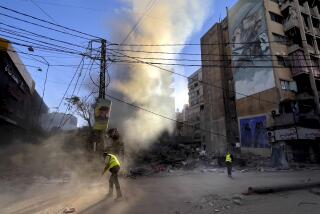Mood Subdued as Israel Faces ‘Fateful Hour’
- Share via
TEL AVIV — “Israel is facing a fateful hour,” President Chaim Herzog told the nation Tuesday as Israelis waited apprehensively under the threat of an Iraqi attack.
“While it is difficult to prophesy what the future will bring and how a cruel tyrant like Saddam Hussein will behave, it is certain that he knows what he will bring upon his country should he attack Israel,” the president said in a message to the nation.
In the current crisis, Israel is setting an example “of how a small but strong country behaves under pressure--with inner quiet and a cool spirit,” Herzog said in his speech. “This is a mark of honor for all of us.”
The mood was subdued along Tel Aviv’s cafe-lined Dizengoff Street and in Jerusalem’s Ben-Yehuda Mall, where people read and listened to the latest news, mindful that Iraq’s President Hussein has threatened to strike Israel if he is attacked by the U.S.-led multinational force in Saudi Arabia.
And in the Israeli-occupied territories, violence broke out Tuesday in reaction to the assassination of two leaders of the Palestine Liberation Organization in Tunisia. The two, Abu Iyad and Abu Loul, both senior aides to PLO leader Yasser Arafat, were killed Monday night by a turncoat bodyguard, Palestinian officials said.
Early indications were that the slayings were the work of the Palestinian terrorist Abu Nidal, a sworn enemy of Arafat. But a Palestinian official at the United Nations accused the Mossad, the Israeli secret service, of a role in the killings, and the charge--quickly denied by Israel--swept through the occupied West Bank and Gaza Strip.
Three Arabs were shot to death by Israeli soldiers, and at least 74 others were injured during the violence, in which demonstrators condemned Israel and praised Saddam Hussein.
The Israeli army ordered a curfew throughout the West Bank, and Arabs in East Jerusalem shut down shops as a gesture of protest.
This morning, as the U.N. deadline for an Iraqi pullout from Kuwait passed--7 a.m. Israeli time, 8 a.m. Kuwaiti time--Israel extended the curfew to the Gaza Strip.
A senior Jordanian security official said in Amman on Tuesday that Syria is massing troops and tanks close to the Israeli-held Golan Heights in a precautionary move against possible Israeli involvement in a gulf war, Reuters news agency reported.
The official also said that Syria has withdrawn the bulk of its special police forces from Lebanon and stationed them in Damascus and other cities to quell possible trouble by pro-Iraqi Syrians.
Syria, Iraq’s traditional Arab foe, has contributed thousands of troops to the U.S.-led force in the gulf. But Damascus says it will not take part in any attack on Iraq and would come to Jordan’s aid in the event of an Israeli attack.
At a military briefing in Tel Aviv on Tuesday, the Israeli air force commander, Maj. Gen. Avihu Ben-Nun, said Israeli interceptors were flying around the clock against the possibility of an Iraqi attack.
If Iraq’s Soviet-made Sukhoi 24 bombers should attack Israel, Ben-Nun said, the Israeli air force could deal effectively with them. If the attack should come from Iraq’s Soviet-made Scud missiles--bearing either chemical or conventional warheads--they could not be stopped, the general said, but their accuracy is not thought to be great.
Should Israel seek to knock out missile launchers in western Iraq, the general said, its air force would have no compunction about overflying Jordan.
After a go-ahead, Israeli planes could hit the missile sites in an hour’s time and could strike the Baghdad region in an hour and a half, he said. Although long-range strikes are difficult, Ben-Nun said, “we have developed the tactics, techniques and capability” to “take them out.”
While Israel appreciates satellite intelligence from the United States concerning Iraqi bases and launchers, he said, Israel knows the locations of most of the launcher sites and basically relies on its own means of predicting Iraqi military moves.
Meanwhile, Israel’s air defense commander, Brig. Gen. Uri Ram, escorted reporters around a U.S.-made Hawk antiaircraft missile battery on a hilltop in the Judean desert halfway between Jerusalem and the Jordanian border.
Israel has about a score of Hawk batteries along the border, which Gen. Ram said was sufficient. At this base, 18 khaki-colored missiles were deployed in six launchers.
The two U.S.-supplied advanced Patriot missile batteries that have been sent to Israel are not fully operational, but Ram said he hoped that they would soon go into service.
The Patriots, currently configured for use against aircraft, are eventually expected to have an anti-missile capability that presumably could counter the Iraqi Scuds.
In the West Bank, meanwhile, Israel Radio’s Arabic-language service has warned that in the event of war, the army will crack down hard on any Palestinian disturbances supporting Iraq.
According to the broadcast, the military’s chief legal officer said tough “wartime” rules to control demonstrations will be imposed.
More to Read
Sign up for Essential California
The most important California stories and recommendations in your inbox every morning.
You may occasionally receive promotional content from the Los Angeles Times.













